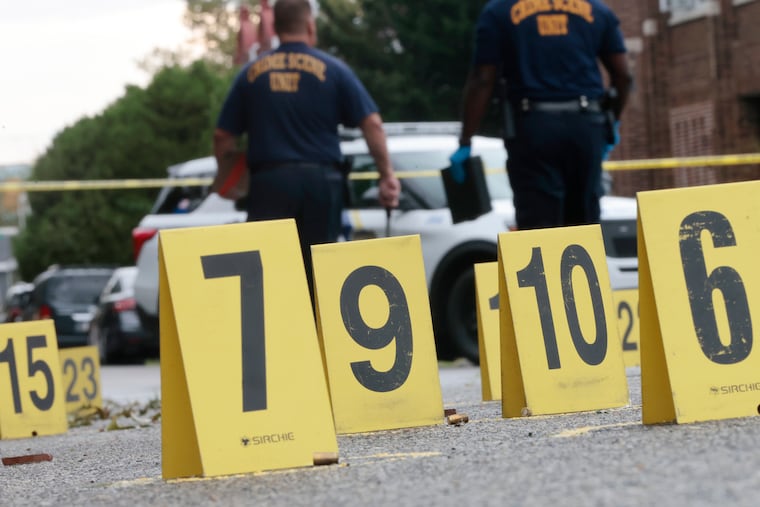As shootings continue unabated, they exact an emotional and economic toll | Editorial
Gun violence has unleashed a cascade of trauma on family, friends, neighbors, and first responders — and taken a mounting financial cost.

Gun violence in Philadelphia continues unabated — with each killing more senseless and heartbreaking than the next.
Consider the losses sustained in one four-day stretch earlier this month: A mother of three was killed by a stray bullet while sweeping outside of a recreation center in West Philadelphia, a man in his mid-30s was shot in the head in Overbrook while carrying groceries home to his wife, a 17-year-old girl was shot and killed while walking her dog in Frankford, and a 37-year-old SEPTA manager was gunned down on the front lawn of his home in Germantown.
The shootings — nearly 1,700 so far this year in our city to date — have unleashed a cascade of trauma on family members, friends, neighbors, and first responders — and exacted a mounting financial toll. Earlier this week, The Inquirer detailed the depths of the human trauma that is impacting nearly every corner of Philadelphia.
The shootings add to the already high stress levels from the COVID-19 pandemic that has claimed more than one million lives, a deadly insurrectionist riot at the U.S. Capitol, the war in Ukraine that could easily spiral into a global conflict, a zigzagging economy, a deepening political divide, and severe weather events brought on by climate change.
» READ MORE: With 750 shootings since Memorial Day, Philadelphia records another summer of mayhem | Editorial
A recent poll found three-fourths of Americans consider gun violence a major problem, while eight in 10 say gun violence is on the rise. Meanwhile, 71% of those polled think that gun safety laws should be stricter. Such a commonsense move would save lives and money.
More broadly, gun violence is impacting how people live their lives. Eighty-one percent said they are anxious about gun violence, while 40% say they have avoided going to public places with large gatherings, such as movie theaters, nightclubs, and concerts, according to a survey by the American Psychological Association.
The trauma from the shootings has an especially grievous effect on the health of children. Guns are now the leading cause of death among children ages 1 to 19, overtaking motor vehicle crashes, which were the leading cause of child deaths for more than 60 years.
The pain and suffering of this crisis reaches far and deep. Studies show that children exposed to gun violence experience more mental health issues than other children, including depression, suicide, and anxiety. They are also more prone to being violent themselves and are more likely to carry guns.
Black and brown people are disproportionately impacted by gun violence, including the nonstop killings of Black Americans by police officers. Besides their emotional impact, those murders foster a deep distrust of the police in Black communities.
The violence also has a financial cost that is borne by all taxpayers.
A recent report by the city of Philadelphia found each murder costs $1.42 million in medical expenses, lost earnings, property damage, and criminal justice costs. The report found that the 351 homicides in 2018 had an economic cost of nearly $500 million. The city has already surpassed that number of murders this year. Nonfatal shootings cost nearly $50,000 in medical expenses and lost productivity. The cost to the city alone was more than $65 million in 2018.
A separate report by the city controller found shootings also reduce property values. The report found a single murder reduced the value of homes sold within three-quarters of a mile of the incident by an average of 2.3%. Reducing gun deaths would add to city coffers. The report said a 10% decrease in homicides over five years would boost the amount of tax revenue the city collects by $114 million.
Philadelphia does not have a monopoly on gun violence. Nearly 49,000 Americans were killed by guns in 2021, shattering the record set the year before. Across the country, the economic cost of gun violence is $557 billion a year, according to a separate report.
Pervasive trauma and the steep financial cost are just two reasons why gun safety laws are necessary. But preventing senseless gun deaths should be a call to action for responsible leaders at every level of government — and a matter of paramount concern for each and every one of us.